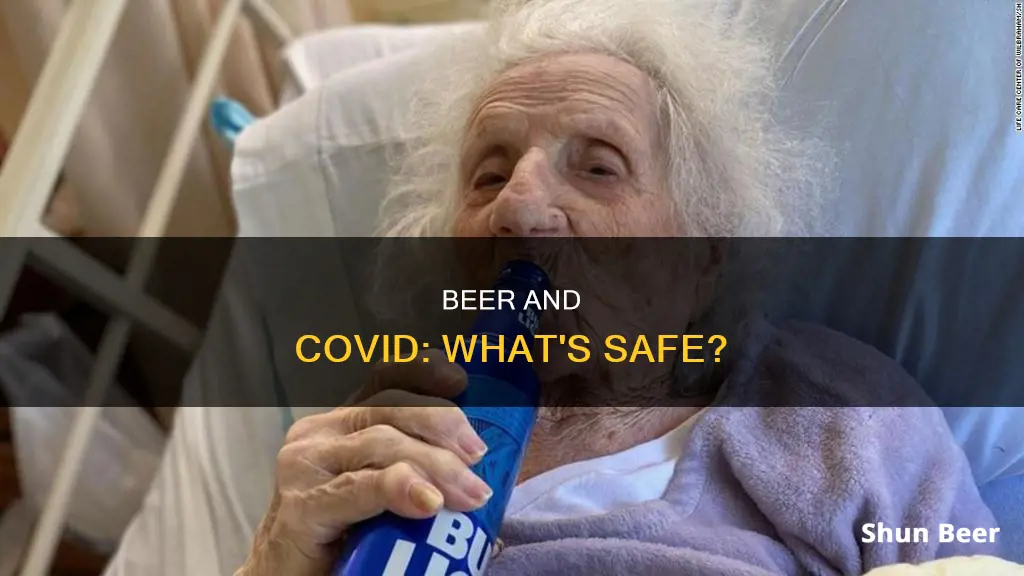
Drinking alcohol is not recommended for people with COVID-19 as it can weaken the immune system and make it harder for the body to fight off the virus. Alcohol can also interfere with the absorption and effectiveness of medications, including Paxlovid, an antiviral drug used to treat COVID-19. In addition, alcohol can cause dehydration, disrupt sleep, and increase the risk of developing other health problems, which can be detrimental to the recovery process. However, some people have shared their experiences of drinking alcohol while having COVID-19 with varying outcomes, and it is advised to consult a healthcare professional for personalized advice.
| Characteristics | Values |
|---|---|
| Drinking beer while having Covid-19 | Not recommended |
| Why | Weakens the immune system, lowers the body's ability to fight off the virus, interferes with the absorption and effectiveness of medications, causes dehydration, disrupts sleep, increases the risk of developing other health problems, slows down the healing process |
| Paxlovid and alcohol | Paxlovid is an antiviral medication that reduces the risk of hospitalization and death in high-risk patients. It is not recommended to drink alcohol while taking Paxlovid as it may interfere with the medication's effectiveness and increase the risk of side effects |
What You'll Learn

Alcohol weakens the immune system
Drinking alcohol weakens your immune system, leaving your body vulnerable to infections and increasing your chances of long-term illness. The National Institute of Alcohol Abuse and Alcoholism (NIAAA) states that alcohol damages the immune system by disrupting the balance of beneficial and harmful bacteria in the gut, which is essential for immune system function.
According to the World Health Organization (WHO), alcohol consumption can compromise the immune system and increase the risk of adverse health outcomes. This is especially true during the COVID-19 pandemic, as alcohol can leave people more susceptible to the virus and worsen health outcomes. Furthermore, drinking alcohol while taking certain medications, such as Paxlovid, an antiviral drug for COVID-19, is not recommended as it may interfere with the absorption and effectiveness of the treatment.
Excessive alcohol consumption is defined as heavy drinking (eight or more drinks a week for women and 15 or more for men) and binge drinking (four or more drinks in a few hours for women, and five or more for men). Even a single bout of binge drinking can leave you at a higher risk of infection for about 24 hours. Alcohol alters the gut microbiome, affecting the microorganisms' ability to support the immune system, and may also damage the immune cells lining the intestines, which serve as the first line of defence against bacteria and viruses.
In addition to weakening the immune system, alcohol consumption is linked to an increased risk of complications from surgery, decreased ability to fight cancer, and prolonged recovery from injury or illness. It can also lead to a range of health problems, including high blood pressure, heart disease, liver disease, and an increased risk of cancer. Therefore, it is crucial to refrain from excessive alcohol consumption to maintain a strong immune system and overall health.
While there may be mixed opinions on drinking alcohol while experiencing mild or no COVID-19 symptoms, it is important to remember that alcohol weakens the immune system's ability to fight off infections. As such, it is generally recommended to avoid alcohol consumption, especially when sick, to give your body the best chance of fighting off the virus and recovering quickly.
The Chemistry of Beer: How It Works and Why It Matters
You may want to see also

Alcohol interferes with medication
Alcohol is a drug that can have harmful interactions with medications. Hundreds of commonly used prescription and over-the-counter drugs may interact adversely with alcohol. These include medications used for allergies, colds, flu, angina, coronary heart disease, anxiety, epilepsy, heartburn, indigestion, nausea, motion sickness, pain, fever, inflammation, and severe pain from injury, among others.
For instance, the combination of opioid painkillers and alcohol should be avoided as it can slow or stop breathing and may even be deadly. Drinking while taking steroids or anti-inflammatory medications can lead to stomach bleeding and ulcers. Alcohol can also interfere with the absorption and effectiveness of medications, including Paxlovid, a new antiviral drug used to treat COVID-19. It can weaken the immune system, making it harder for the body to fight off infections.
Alcohol may also intensify medication side effects such as sleepiness, drowsiness, and light-headedness, which may interfere with concentration, driving, or operating machinery. It can also increase the risk of falls and injuries, especially in older people.
Additionally, alcohol can have a negative impact on overall health and well-being, causing dehydration, disrupting sleep, and increasing the risk of developing other health problems. It is important to observe warning labels, ask healthcare professionals, and be cautious when consuming alcohol with any medication to avoid dangerous interactions.
Ocean City Beach: Drinking Beer, What's Allowed?
You may want to see also

Alcohol causes dehydration
While there is no direct interaction between Paxlovid, a medication for COVID-19, and alcohol, drinking can weaken your immune system and make it harder for your body to fight off the virus. Additionally, alcohol can cause dehydration, disrupt your sleep, and increase your risk of developing other health problems.
Alcohol is a diuretic, which means it promotes urine production and can therefore lead to dehydration. This is especially true when consumed in large quantities. Dehydration can result in a range of symptoms, from mild to severe, and can even be life-threatening if left untreated.
Drinking alcohol can interfere with the body's fluid and electrolyte balance. Alcohol enters the bloodstream quickly and can suppress the release of the antidiuretic hormone vasopressin, which controls water retention and urination. This results in increased urination and fluid loss.
To counteract alcohol-induced dehydration, it is recommended to consume alcohol in moderation, drink water or other hydrating beverages, and eat hydrating foods. It is also important to be aware of the signs and symptoms of dehydration and take steps to prevent it, especially for those already at risk.
In the context of COVID-19, while some people report drinking alcohol without any negative effects, it is generally not recommended. Alcohol can weaken the immune system, making it harder for the body to fight off the virus. It is important to prioritize overall health and well-being when recovering from COVID-19, which may include avoiding alcohol and staying hydrated.
Beer and Keppra: What You Need to Know
You may want to see also

Alcohol disrupts sleep
According to the National Sleep Foundation, the production of adenosine, a chemical in the brain that acts as a sleep-inducer, increases while drinking alcohol. This allows people to fall asleep quickly, but the chemical quickly subsides, making them more likely to wake up throughout the night.
Drinking before bed is also linked to more slow-wave sleep patterns called delta activity, but alpha activity, which indicates wakefulness with eyes closed and often precedes sleep, is turned on at the same time. Experiencing these two brain wave activities simultaneously is thought to inhibit quality rest. Additionally, alcohol inhibits REM sleep, often considered the most mentally restorative phase of sleep.
A 2018 study found that alcohol significantly reduced sleep quality, regardless of whether consumption was light, moderate, or heavy. The study also showed that alcohol affected men, women, and both active and sedentary individuals similarly, and that it affected the sleep of younger people more than older adults.
Alcohol abuse and dependence are associated with chronic sleep disturbance, lower slow-wave sleep, and more rapid eye movement sleep than normal, lasting long into periods of abstinence and potentially playing a role in relapse.
Beer Drinking in Alaska: What's the Deal?
You may want to see also

Alcohol may cause health complications
Drinking alcohol can weaken the immune system, making it harder for the body to fight off infections, including COVID-19. It can also interfere with the absorption and effectiveness of medications and increase the risk of developing other health problems. Alcohol-related harm can occur not only to the drinker but also to others, as it increases the risk of injuries, road traffic accidents, falls, drowning, burns, sexual assault, intimate partner violence, and suicide.
The impact of alcohol consumption on health outcomes is influenced by various factors, including the amount consumed, drinking frequency, health status, age, sex, and personal characteristics. It is important to note that there is no safe level of alcohol consumption, and even low levels can carry health risks. Therefore, it is crucial to be aware of the potential health complications associated with alcohol consumption and to take individual actions to protect against its harmful effects.
Beer and Yeast Infections: What Girls Should Know
You may want to see also
Frequently asked questions
No, it is not recommended to drink alcohol when you have COVID. Alcohol can weaken your immune system and make it harder for your body to fight off the virus.
Drinking alcohol can weaken your immune system and interfere with your body's ability to fight off infections, including COVID-19. It can also cause dehydration, disrupt your sleep, and increase your risk of developing other health problems.
While there is no direct interaction between Paxlovid and alcohol, it is generally not recommended to drink alcohol while taking this medication. Alcohol can weaken your immune system and interfere with the absorption and effectiveness of Paxlovid.
Drinking alcohol while on Paxlovid can increase the risk of side effects such as dizziness, drowsiness, and liver damage. It may also lead to an overdose or worsening of side effects as alcohol can impair the liver's ability to metabolize the medication.
Water is the best drink to have when you are sick as it keeps your system hydrated and boosts your immune system. Coconut water, hot ginger tea, and citrus drinks are also recommended as they are high in nutrients and can help your body fight off infections.







